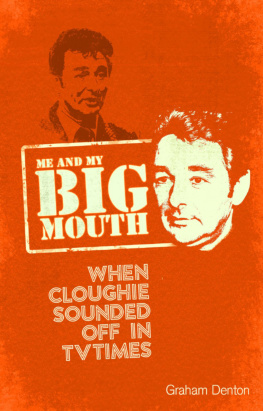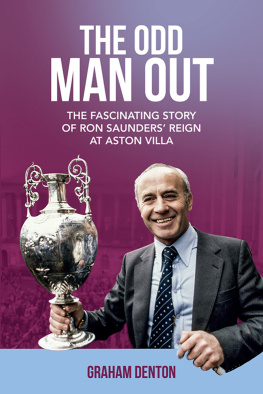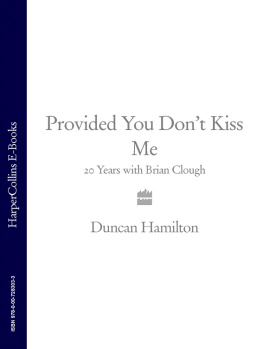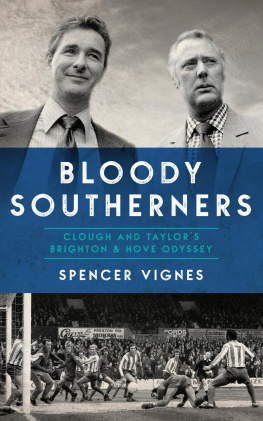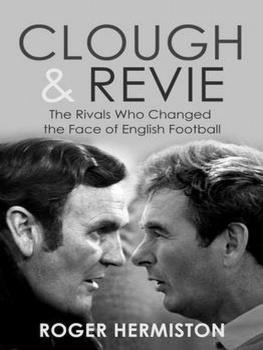First published by Pitch Publishing, 2019
Pitch Publishing
A2 Yeoman Gate
Yeoman Way
Durrington
BN13 3QZ
www.pitchpublishing.co.uk
Graham Denton, 2019
All rights reserved under International and Pan-American Copyright Conventions. By payment of the required fees, you have been granted the non-exclusive, non-transferable right to access and read the text of this e-book on-screen. No part of this text may be reproduced, transmitted, downloaded, decompiled, reverse-engineered, or stored in or introduced into any information storage and retrieval system, in any form or by any means, whether electronic or mechanical, now known or hereinafter invented, without the express written permission of the Publisher.
A CIP catalogue record is available for this book from the British Library
Print ISBN 978-1-78531-531-2
eBook ISBN 978-1-78531-602-9
--
Ebook Conversion by www.eBookPartnership.com
Contents
For Atticus Thomas Neville Bayman, a little look at what football was like when your grandad was just a boy

Acknowledgements
For their help and guidance in making this book possible, my heartfelt thanks go to the following: Graeme Wood (whose Twitter posts sparked the idea), David Abbott (TI Media Limited), Paul Camillin, Jane Camillin, Duncan Olner and Michelle Grainger, as well as my wife, Dianna, and children, Catherine and Frankie, for their love and support throughout. The encouragement of both author David Snowdon and my old poetry chum James Carter was also very much appreciated. Cheers!
Introduction
LOUD mouth. Big head. A proper Charlie. Genius. These are just a few of the names Brian Clough has collected in his days as a football manager and television commentator. Which is true? The simple answer would be to say that Clough is all of these, for he is a bewildering maze of inconsistencies.
So began a feature titled That Mister Clough in the 2228 September 1973 issue of TVTimes. It was written by way of an introduction to the man the frankest voice in football who, the following week, was joining the popular TV listings magazine with a regular, hard-hitting column which will be devoted to all football enthusiasts throughout the country. Launched 18 years earlier, the periodical known for its access to actors, with a large circulation and readership, was now giving a stage to someone who loved nothing better than a chance to play to an audience.
A maze of inconsistencies he may have been, but that Mister Clough needed little introduction. What he indubitably was was the most media-savvy manager English football had ever known. No other figure in the game before had had a flair for publicity quite like him. And if football, as one of the many clichs about it goes, is a game of opinions, around that time no one played it more passionately or with greater enthusiasm than this son of the north east. Among the UK population of over 56 million, it had made him a household name.
Clough got the nation talking about football. Love him or hate him and he certainly divided the crowd the man who, in 1975, Radio Times would label soccers most outspoken luminary was almost impossible to avoid. Even in the days when coverage of the sport was infinitely more limited compared with what it would eventually become, Clough was virtually omnipresent. Popular with the press, he provided perfect copy with his forthright outlook on the game, his inflammatory comments about those running it and often bitter and savage attacks on his managerial peers, his words seized upon whenever he opened his mouth.
Whether it be on the back or front pages of the tabloids, on TV chat shows, during appearances on ITVs On the Ball or The Big Match, performing as a pundit on World Cup panels, giving pre- and post-match interviews on the radio, making after-dinner speeches, featuring in the football magazines of the day like Goal and Shoot!, or penning pieces for the papers, Clough was there, airing his views and sharing his thoughts on every subject under the sun, little caring whether or not anyone wanted to know them. So familiar was his face, his voice (Now then, young man ), his mannerisms, TV impressionists could do even a poor take-off and no one was in any doubt who the impersonation represented.
Depending on how the mood (or someone) took him, Clough could be charming or rude, polite or abusive, his language coated with honey or laced with poison. But one unchanging aspect of his personality was a total, sometimes brutal, honesty. Ever since his playing days when, as a livewire striker with first Middlesbrough then Sunderland, he set a Football League record of 251 goals in 274 matches, Clough had established a reputation as a blunt and straight-to-the-point individual, whose habit of expressing himself without inhibition had garnered him as many enemies as friends. Such an attitude often led to tense relations with both management and teammates.
At Ayresome Park, where Clough considered the club far too easy-going at times, he was quite prepared to ruffle feathers in his burning desire to make his team the best in the business, as evidenced by one example from his early days there. On Monday mornings on the training field, when the clubs coach asked about any mistakes that had been made during the weekend away game bizarrely, he often didnt go with the team it was Clough who boldly marched up to the manager, Bob Dennison, to point out how ridiculous a situation it was. From then on, the coach travelled to every single away game. Clough wasnt necessarily popular, but he, and the club, knew he was right.
His influence soon grew. Too big for some. As adept at finding the back of the net as he was, Clough, with his cutting words, could incur the wrath of colleagues just as easily. Certain players suspected him of talking behind their backs. When he openly attacked the sides defensive deficiencies, then also publicly accused some of his teammates of betting against the team and deliberately letting in goals, for one friendly game against Hibs they actually hatched a plan to freeze him out and not supply him with any of the passes he liked to feed on. On another occasion, a round robin was sent to the manager staunchly expressing how they didnt want Clough as their captain.
As a player, arguably he had every right to mouth off. No centre-forward in soccer history can boast a record comparable to the trail which ace marksman Brian Clough blazed through six full seasons of league football, enthused Argus (of the Sunderland Echo) in the programme notes of Cloughs testimonial match in 1965. Dixie Dean, Hughie Gallacher and Arthur Rowley scored more with time on their side, but none of them matched the pace at which Brian made goals his business.
Only needing half a chance and the ball was in the net, Clough had a phenomenal strike rate. In successive campaigns, in 1957/58 and the following year, he finished as the Football Leagues top scorer with 40 goals and 43 respectively. For three years on the trot he led the Second Division list and by 1960 had become probably the most lethal forward playing in British football, Cloughs scoring feats so prolific and regular that, as sportswriter Basil Easterbrook put it, His stature would be denied only by fools or men of malice.

